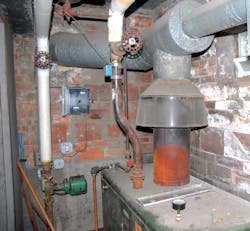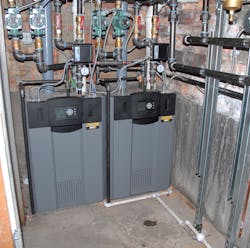Boilers Improve Comfort, Efficiency and Reduce Maintenance for Co-op
In 1962, Chatham Park Village Cooperative (CPVC) in Chicago, a not-for-profit housing complex owned and operated by its members, converted a 1930s heating system that disbursed steam through underground tunnels to natural-gas boilers and commercial water heaters. The move to individual boilers was a significant upgrade and measurable improvement for the time. By 2013, however, the original 1962 boilers were operating at only about 70-percent efficiency. Even boilers installed just a few years earlier could not maintain better than 82-percent efficiency. In addition to energy waste, CPVC was facing exceedingly high energy costs.
DRF Trusted Property Solutions—Plainfield, Ill.-based provider of hot-water-heater and other plumbing services—and Metropolitan Industries Inc.—Romeoville, Ill.-based manufacturer of custom mechanical/HVAC solutions, specialty controls, and pumping packages—collaborated on an upgrade of CPVC’s space- and water-heating systems.
Two LAARS NeoTherm condensing hydronic boilers, four circulator pumps, and, depending on the size of the building, one or two indirect water heaters were installed in each of the 63 buildings’ mechanical room.
Work began in November 2013, with completion planned for mid-March 2014. A standardized process and strategic schedule were important to maintaining a seamless transfer from old systems to new. Within about two weeks, Metropolitan completed fabrication of 19 mid-size boiler systems at its shop.
The new system was designed to improve overall building comfort and efficiency and reduce boiler maintenance, with the added bonus of a lifetime indirect-water-heater warranty. To assist with the cost of the project, DRF secured a utility rebate of $590,620 from Peoples Gas, a regulated natural-gas utility serving Chicago.
The installation of NeoTherm boilers and indirect water heaters in each CPVC building is expected to be the largest gas-saving measure of its kind in Peoples Gas territory. The boilers use only the energy required to produce the exact amount of heat needed, minimizing waste and enabling the heating system to operate at 95-percent thermal efficiency. The indirect water heaters, meanwhile, use the boilers as a heat source, minimizing the need for a second heat source and operating at energy efficiencies as high as 99 percent. The upgraded system aligns with Mayor Rahm Emanuel’s Sustainable Chicago 2015 energy-efficiency goals, which include improvement of citywide energy efficiency by 5 percent.
The new heating system is projected to save 262,000 therms per year. The environmental impact is equal to removing 290 passenger vehicles from the road or keeping 522 tons of waste out of landfills each year. The energy efficiency of each heating and domestic-hot-water system is expected to improve to 95 percent, with savings of $4,454,000 in energy costs over 20 years expected.
For Design Solutions author guidelines, call Scott Arnold, executive editor, at 216-931-9980, or write to him at [email protected].


